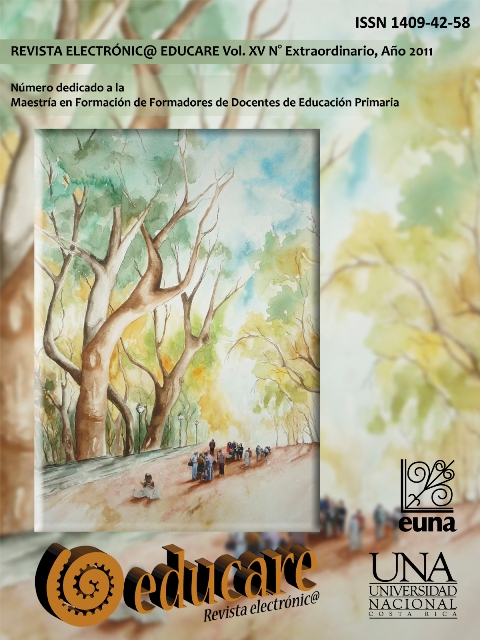Proposal for Academic Achievement and Permanence of Students in the 7th Grade (1)
DOI:
https://doi.org/10.15359/ree.15-Ext.1Keywords:
Educational proposal, research, transition, primary education, secondary educationAbstract
This paper analyzes the impact of change processes experienced by many student populations when completing primary education (1st-6th grade) and starting secondary education (7th-11th grade). Based on the research conducted, this paper describes situations and aspects that may result in conditional factors for the student’s adjustment at this level: time-space changes, as well as organizational and dynamic changes that would set the new educational environment and social context in which this new stage will be developed. Such conditional factors that affect learning in incoming students: programs, teaching methodology, learning styles and new evaluation methods will be discussed. As a result of this research, a proposal is presented to facilitate transition from primary to the secondary education. This proposal includes guidelines for awareness and strengthening of pedagogical mediation, which would contribute to the permanence of students from all types of institutions in the education system.
(1) [Translator’s note: The Costa Rican education system is composed of primary education (1st-6th grade) and secondary education (7th-11th grade).]
References
Alfaro, M., Brenes, A., Gamboa, A., Jiménez, S., Martín, J., Ramírez, A. ... Zúñiga, A. (2008).
Construcción del perfil de desempeño docente para el sétimo año de la Educación Pública
(Informe final de investigación del Proyecto Perfiles, Dinámicas y Desafíos de la Educación
Costarricense, tercera etapa). Heredia, Costa Rica: CIDE-Universidad Nacional.
Consejo Nacional de Política Pública de la Persona Joven. (2008). Primera encuesta nacional de
Juventud Costa Rica (principales resultados). San José, Costa Rica: Fondo de Población
de las Naciones Unidas (UNFPA). Recuperado de http://www.unfpa.or.cr/dmdocuments/
Encuesta_Juventud.pdf
Guendel, L., Osorio, R. y González, M. (1999). La educación: política social para el ejercicio de la
ciudadanía. En Política Social y Educación en Costa Rica (pp. 21-57). San José, Costa Rica:
UNICEF-Costa Rica.
Hernández, A., León, A., Ruiz, S., y Zúñiga, I. (2002). Validación de un módulo de selección de
candidatos a docentes, fundamentado en la idoneidad de sus características personales y
la percepción de su futuro papel profesional. San José, Costa Rica: Coordinadora Educativa
Cultural Centroamericana (CECC).
Miranda, A. (2008). Juventud rural y educación: Un desafío a la equidad (Cap. 6). En M. Gutiérrez
y N. Piedra (Coords.), VI Estado de los derechos de la niñez y la adolescencia en Costa Rica
(pp. 177-186). San José, Costa Rica: UNICEF. Reecuperado de http://www.unicef.org/costarica/13222.htm
Miranda, A., Bonilla, N. (2010). Mejoramiento del desempeño académico en el sétimo año de la
Educación Secundaria, en los estudiantes y las estudiantes provenientes de las escuelas
rurales, como una forma de propiciar su permanencia en la Educación Secundaria. (Tesis
de Maestría sin publicar). Universidad Nacional de Costa Rica, Heredia.
Programa Estado de la Nación. (2011). Estado de la Educación 3 (Cap. 3). San José, Costa Rica:
Autor. Recuperado de http://www.estadonacion.or.cr/images/stories/informes/educacion_003/
docs/Parte_1_Capitulo_3.pdf
Downloads
Published
How to Cite
Issue
Section
License
1. In case the submitted paper is accepted for publication, the author(s) FREELY, COSTLESS, EXCLUSIVELY AND FOR AN INDEFINITE TERM transfer copyrights and patrimonial rights to Universidad Nacional (UNA, Costa Rica). For more details check the Originality Statement and Copyright Transfer Agreement
2. REUTILIZATION RIGHTS: UNA authorizes authors to use, for any purpose (among them selfarchiving or autoarchiving) and to publish in the Internet in any electronic site, the paper´'s final version, both approved and published (post print), as long as it is done with a non commercial purpose, does not generate derivates without previous consentment and recognizes both publisher's name and authorship.
3. The submission and possible publication of the paper in the Educare Electronic Journal is ruled by the Journal’s editorial policies, the institutional rules of Universidad Nacional and the laws of the Republic of Costa Rica. Additionally, any possible difference of opinion or future dispute shall be settled in accordance with the mechanisms of Alternative Dispute Resolution and the Costa Rican Jurisdiction.
4. In all cases, it is understood that the opinions issued are those of the authors and do not necessarily reflect the position and opinion of Educare, CIDE or Universidad Nacional, Costa Rica. It is also understood that, in the exercise of academic freedom, the authors have carried out a rogorous scientific-academic process of research, reflection and argumentation thar lays within the thematic scope of interest of the Journal.
5. The papers published by Educare Electronic Journal use a Creative Commons License:














 The articles published by Educare Electronic Journal can be shared with a Creative Commons License:
The articles published by Educare Electronic Journal can be shared with a Creative Commons License: 



